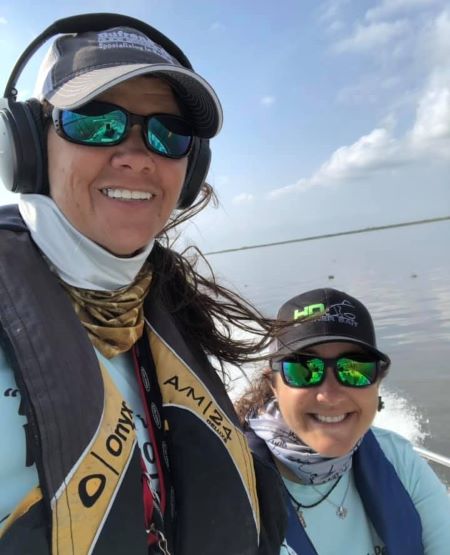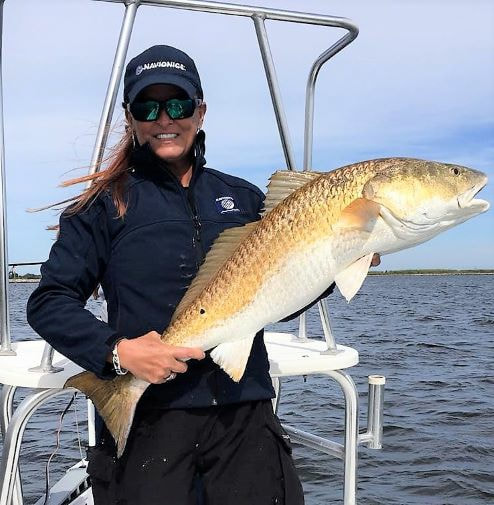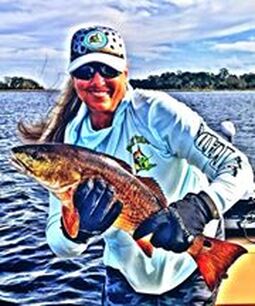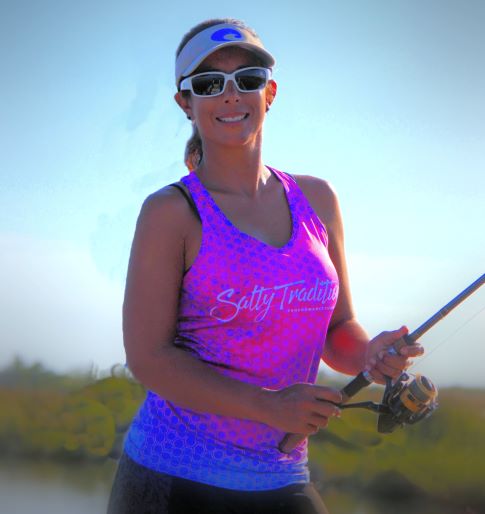|
3/9/2019 1 Comment redfish women part 2In Part One of this two-part article I discussed some of the various facets of women in competitive redfishing. I contacted some of the women and asked them how they felt about this topic. I asked them to discuss and list some of the advantages/disadvantages of women entering competitive angling. I got some interesting answers. Stacy Fretina believes that women are capable of fishing with equal expertise as men and makes several observations: “It is a male dominated sport and it is very difficult to break the barriers and get men to accept us as anglers just like themselves.” “There has never been a push to support and expose women anglers with women-specific events until the past year.” “I don’t believe women have an advantage over men. In fact, I think they have a disadvantage until they can prove themselves as anglers and not just women posing with fish.” “I would like to see more women-oriented fishing seminars where we can learn the things that make us better anglers.” “It would also be very helpful if more men would accept and mentor women anglers the way they were taught when they started.” Hallie Burnett also believes women can compete on the same level and with the same expertise as men and notes that: “There are no physical or mental limitations that should restrict competitive angling to men only. Many other sports require size, strength and speed to be successful whereas in fishing these attributes really don’t matter. In fact, fishing has more to do with patience; arguably giving women the advantage.” “Sometimes it seems that everyone expects us to fail and there is a perception that we are moving in on the men’s turf; both of which can be very powerful motivators. I think we all have a little bit of “Rosie The Riveter” in us.” “Men definitely have the advantage when it comes to the good old boy network. That’s not meant to be derogatory, it’s just a fact and it exists. But with more and more women joining the fray and learning to trust one another there has been a bit of a shift in that regard.” “There is an intimidation factor involved and some women are uncomfortable around that many men in a competitive arena.” “A lot of the men in tournaments treat women ‘like one of the guys’ and that’s tough for some of them to take. Not many women can handle that. It’s one of those ‘be careful what you wish for’ situations.” “Men tend to close the door when it comes to sharing information with the women anglers. It’s that very information that, when added to years of experience, becomes a multiplier for performance. Women don’t have that network – yet.” “I know that every woman has their reason why they don’t just jump out of the proverbial frying pan and into the fire but I truly hope they find their passion and make it happen!” Starr Boykin - Barbara and I were one of the first all-female teams to consistently compete on the redfish circuits and we felt pretty much like we were on our own out there. We had to learn everything from the ground up and, back then, there was no one we could relate to for help and information. “There is still a disadvantage being a women’s team among the men because there is still not a large number of men willing to share their knowledge and information with an all-female team.” “Many women who would like to compete are raising families and can’t get the time or resources to compete.” “Seminars directed specifically at competitive anglers would be helpful for both men and women.” “Handling equipment and boats is the same for both men and women and the only difference is that women just don’t often get the experience and the confidence they need.” “It is my fondest hope that Barbara and I have been a positive influence to some of the women that are now stepping up to compete.” Barbara Scopelitis offers further insights: “The perceived success or lack of success by women’s teams is information related rather than gender related.” “There are very few female fishing guides and they tend to do well in their area but when traveling say, from Florida to Louisiana or Texas, they would need help from their male counterparts and it just doesn’t happen.” “It took Star and I years at the different venues to find decent fish. We have had a few high finishes like 2nd or 3rd which is pretty miraculous given the current situation.” “One of our biggest challenges was learning where the fish go with changing weather patterns. We didn’t have any information about that and it was a difficult problem to overcome. We were in 1st place after day one in Port A a few years ago and a norther came through that night. The next day our fish were gone. The local guys knew where to go but we didn’t. No one had ever shared that kind of information with us.” “We have hung in there and fished for the camaraderie and for the pure joy of it. We hope we have been an inspiration to the all-female teams that are out there now. And we hope that some of the barriers will fall a little more easily now.” “I would strongly recommend to women interested in competing that they hone their boating and navigation skills as well as learning to make repairs on the water before they get into serious competition.” Manny Aldrich Altman also has some observations to share: “I think there is a misconception that men fish better than women. I think there is no difference and it depends a lot on how you were raised. I was fortunate to be raised by a mom who taught us how to fish and crab and survive off the land.” “The majority of anglers know when a woman can fish and I think it is a bit intimidating to some of them.” “My personal preference is to fish with my husband because we are a great team. It’s interesting that most of the guys think I’m just along for the ride.” “Information sharing and teaching is the big bridge that hasn’t been crossed yet.” April Dubroc Hrubes: I’ve been fishing since I was two years old with my dad and great grandfather. I had the benefits of learning both pier fishing and boat fishing from them. It was my husband, Shawn Hrubes, who taught me to fish with artificial baits. He got me interested in competitive fishing about six years ago in an LASS tournament. After that first tournament I was hooked. Two years later we fished the IFA and the Tito’s events. Then Shawn wanted to fish the IFA with his dad and, although I wanted to fish, I didn’t have a partner. I began searching for a partner and found Melissa “Missy” Larson. We have been together and learning this game ever since. “One of the biggest challenges is having time on the water. We both work and it is hard for both of us to get off.” “I believe that more and more men on the tours are accepting us as just another competitor and not as something unusual. We still don’t have the advantage of being in the information circles though, but I think that will come.” “I also believe that more seminars directed towards giving women confidence to compete and bringing women into the sport are needed. It doesn’t matter who is teaching them just that the information is pertinent to success on the water.” “The cost of the participating in competitive redfishing is also a factor. Boat maintenance and entry fees alone are fairly significant.” “Confidence is probably the biggest difference I see in men vs women anglers. I think women that have had to learn on their own lack the confidence and overall support that men entering the field have.” Melissa “Missy“ Larson also believes women can be just as competitive as men because, she says, "it is a sport that requires constant learning and time on the water". Missy is all about learning and teaching: “Dads, boyfriends, and husbands take their women fishing but most women are not encouraged to learn to launch, drive, and maneuver a boat.” “Minor repairs is another area that is ‘all men’ and women are rarely ever taught what to expect or do about on-the-water issues.” “Competitive fishing is more than just casting and catching – it’s work! And we need someone to teach and coach us into that world.” “You have to have a passion for it because it’s hard work and takes a great deal of time.” “Courses teaching the basics of boating terminology, boating etiquette, differences in rods and reels, what baits to use in different areas and times of the year, knot tying, GPS navigation, and more.” “Women need to realize that they are not alone out there and it is an amazing freedom once you start doing it regularly.” “One of the most important things is to have coaches. Listen to them, they will guide you. I have been lucky to have the support of my husband and some great coaching from Chad Dufrene and Devin Denman as well constant encouragement from Wanda Stewart.” Jennifer Sasser believes women can fish as well as men and sometimes maybe even better since women seem to be more focused and patient in the pursuit of fish. Some of Jennifer’s thoughts are as follows:
“Some of the disadvantages women face include the fact that most fishing gear/equipment is geared towards men and most, not all, men feel like they must dominate when it comes to fishing and and never really see what their women can do.” “Some of the reasons there aren’t as many women competing is that women are still the ones responsible for managing the home, kids, pets, school, job, etc. It is much more difficult for a woman with a family to take off and go fishing so they miss out on a lot of time on the water.” “I would tell any lady coming in to the sport to be brave, listen, take notes, and reach out to other lady anglers for help and guidance. Find a partner that has the same passion for the sport as you do and don’t be intimidated by negative people – male or female. Have fun and most importantly - Don’t give up!”” SO, that’s it boys. If you’re scared say scared. If you’re not scared, then choose to accept and mentor these women who are pioneering their participation in the sport because they are persevering in spite of the odds stacked so heavily against them. I confess that I look forward with great anticipation to the first all-female team to win a title. And now, I shall now seek seclusion behind my shield maidens for protection from the inevitable flurry of slings and arrows that will be lofted at my person.
1 Comment
Barbara Scopelitis
3/1/2020 11:22:05 pm
Actually the all woman teams have been very successful when compared to the number of all male teams competing. Barbara Scopelitis/Starr Boykin have had a 2nd & 3rd place finish & Merrily Dunn Simmons/Leiza Fitzgerald had a 3rd place finish. Considering there have only been a total of 4 all woman teams over the past 16 years compared to 100s of all male teams that have never finished in a top 3 position. Anyone ever winning a tournament will tell you that on any given day to catch the perfect fish at the perfect time and have the measurements & weight surpass the entire field is an extraordinary feat. Some have had great fish and don’t make it back in time or have had their boat break down & can’t get back. Ladies when you’re at the Captain’s meeting look around at the 100 plus teams and know the women’s teams have performed better than 99% of the teams in that room. That is success. The time will come when everything falls together perfectly and you will be in that number one position and will be overcome because of the respect you’ve always had for the sport and your fellow competitors.
Reply
Your comment will be posted after it is approved.
Leave a Reply. |




 RSS Feed
RSS Feed
